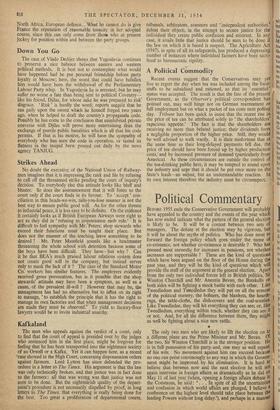Kafkaland
The man who appeals against the verdict of a court, only to find that the court of appeal is presided over by the judges who sentenced him in the first place, might be forgiven for feeling that he has been transported into the nightmare society of an Orwell or a Kafka. Yet it can happen here, as a recent case showed in the High Court, concerning dispossession orders against farmers. Lord Lytton has since defended the pro- cedure in a letter to The Times. His argument is that the law was only technically broken, and that justice was in fact done to the farmers: all that was wrong was that justice was not seen to be done. But the nightmarish quality of the depart- ment's procedure is not necessarily dispelled by proof, in long letters to The Times, that everything Is really being done for the best. Too great a proliferation of departmental courts, tribunals, arbitrators, assessors and independent authorities defeat their object; in the attempt to secure justice for the individual they create public confusion and mistrust. In any case, it avails little that justice should be seen to be done if the law on which it is based is suspect. The Agriculture Act (1947), in spite of all its safeguards, has produced a depressing number of instances where individual farmers have been sacri- ficed to bureaucratic rigidity.


























 Previous page
Previous page